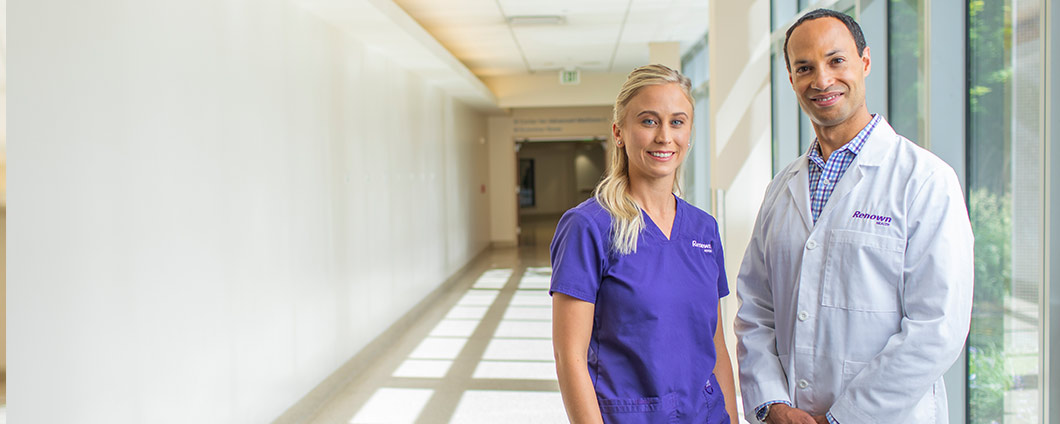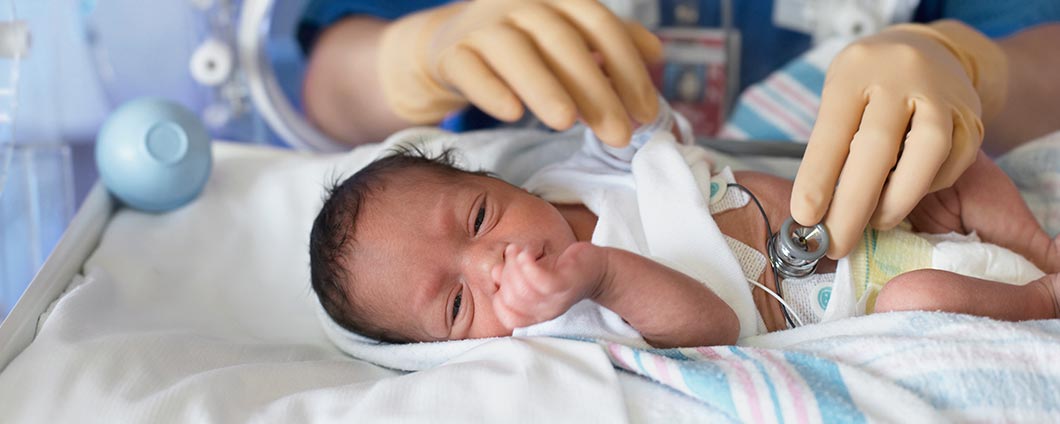Search
Results for 'medical assistant'
Clear-
8 Reasons to See a Cardiologist
While February is recognized as American Heart Month, it’s important to prioritize your heart health 365 days a year. Cardiologists play an integral role in our overall health and wellbeing – they are the experts when it comes to preventing and treating heart and vascular diseases. Dr. Jad Al Danaf of Renown Institute for Heart & Vascular Health shares eight reasons to visit a cardiologist. 1. Abnormal EKG The American Heart Association states an electrocardiogram, abbreviated as EKG or ECG, is a recording of the heart’s electrical activity to measure the rate and rhythm of the contractions in the upper and lower chambers of the heart. An EKG detects heart problems or abnormalities. If you have an EKG that shows abnormal results, you’ll want to see a cardiologist. An abnormal EKG can mean many things, such as irregular heart rate, heart rhythm abnormalities in the shape or size of the heart, medication side effects, and more. A cardiologist is most qualified to evaluate an abnormal EKG and determine the cause. 2. Immediate family history of heart disease or sudden cardiac death Knowing your family health history is essential to identify if you’re at risk for certain health conditions such as heart disease. For example, if you’re aware of anyone in your immediate family who had or has had heart problems or passed away from sudden cardiac death. In that case, you’ll want to discuss it with a cardiologist so they can determine if screenings, medications, or lifestyle changes are needed to help lower your risk. 3. Chest pain or shortness of breath with exertion If you have chest pain or shortness of breath that starts or worsens with activity, it may indicate a heart problem, and you should schedule a visit with a cardiologist immediately. Severe chest pain might be a sign of a heart attack or other serious medical emergency. If you’re experiencing severe chest pain, shortness of breath, or any other signs of a heart attack, call 911 immediately. 4. High blood pressure Have you had a high blood pressure reading? If so, it’s recommended to consult with a cardiologist for further evaluation. High blood pressure puts you at risk for heart disease and stroke, as uncontrolled high blood pressure can damage arteries, reducing blood flow and oxygen to your heart and brain.
-
A Therapist's Tips to Prevent and Manage Osteoporosis
Want to know more about osteoporosis and osteopenia? We'll dive into these conditions and give you some handy tips on preventing future problems and taking care of your bones. What is Osteopenia? Osteopenia (low bone density) is the initial stage of bone mineral density loss, which can eventually progress to osteoporosis if steps are not taken to prevent it. What is Osteoporosis? Osteoporosis is a condition that weakens our bones. While it literally means “porous bone," it doesn’t mean that our bones are doomed to succumb to the changes that can happen to us silently over time. Our bones are living tissues that are constantly breaking down and remodeling themselves. Osteoporosis and osteopenia are typically diagnosed by testing bone mineral density using scans that your primary care provider can easily order. This is important testing because it dictates your risk of breaking a bone in common areas like your hip, wrist or spine. It also helps set the stage for talking with your healthcare team to develop a treatment plan. Most people will reach their peak bone mass in their mid to late twenties. There are several factors that increase our risk of osteoporosis or osteopenia as we age, such as menopause, genetics and other lifestyle factors. However, there are several things you can do to mitigate this breakdown and assist your body in the constant remodeling it does to our bones. 3 Controllable Factors to Build Strong Bones 1. Talk to your primary care provider They can go over a plan and prescribe things such as vitamin D, calcium and medications that can help if you are at risk or have osteoporosis or osteopenia. 2. Maintain a healthy diet Talk to a dietician if you need further help as they can be an invaluable resource to develop a plan. Eat foods rich in calcium, vitamin D and vitamin C. These assist with the rebuilding of bone. Examples include but aren’t limited to leafy greens, legumes, salmon and healthy dairy products. Don’t smoke — it directly correlates with a decrease in bone mass. Smokers also take longer to heal from a fracture. Limit alcohol to two to three beverages per week. Alcohol interferes with the production of vitamins needed to absorb calcium and the hormones that help protect bones. 3. Exercise Talk to your primary care provider to get a referral to physical therapy if you need help with exercise. Our bones adapt to the stresses we put them through. Therefore, exercise should be tailored to putting the right stress on our bones. There is good quality research that most exercise is safe when dealing with less bone mineral density. The exercises should be progressively challenging and increase the load for resistance and weight training at least two to three days a week. Examples include squats, step-ups, chest presses and rows. Exercises higher in velocity will lead to more power and bone adaptation. Examples include quicker push-ups, marching and quicker walks. Exercises that are weight-bearing will lead bones to adapt to the stress placed on them. Movements such as mini stomps, step-ups, jumping, jogging and so forth may be used depending on how your body tolerates these things to really stimulate bone adaptation. There are aspects of aging and bone health we can’t control, but we can take steps to minimize the chances of bone loss and osteoporosis. Talk to your healthcare team to determine your risk and don’t forget to show your bones a little TLC – you’re going to need them.
Read More About A Therapist's Tips to Prevent and Manage Osteoporosis
-
General Cardiology
At Renown Health, we're dedicated to providing exceptional care to patients with a wide range of cardiac conditions. Our General Cardiology Program specializes in assessing heart diseases, identifying existing conditions and developing personalized treatment plans for each patient.
-
Neonatal Intensive Care Unit (NICU)
The Wilbur D. May Neonatal Intensive Care Unit (NICU) at Renown Health is the region’s only Level III NICU and allows care teams to provide specialized and compassionate care for newborns who are born prematurely or require special treatment. This dedicated team is available 24/7 to deliver the highest level of evidence-based care for our tiniest patients. Our NICU also offers a comprehensive range of services, including meticulous feeding schedules, lactation assistance and a nurturing approach to care. We recognize the importance of early bonding between parents and their newborns, and our team is dedicated to facilitating and encouraging this crucial connection. With our focus on personalized care and unwavering commitment to the well-being of your baby, you can trust that they are in the best hands possible at Renown.
-
-
25Oct
Ticket includes partner. This class helps prepare parents for emergencies that may occur with infants and toddlers. Along with car seat safety and basic child proofing, discussion will include prevention and treatment of common injuries. Students will also learn and practice the skills necessary to perform infant and child CPR (cardiopulmonary resuscitation), as well as the skills necessary to assist a choking infant and child. The American Heart Association Family & Friends “Infant and Child CPR and Choking” course is for those who want to learn Infant and child CPR but do not need a course completion card in CPR for their job. Grandparents and other caregivers are welcome to attend. This class is geared towards infants and toddlers and includes both Infant and Child CPR. This class covers the following topics: Car seat safety education Safe sleep Child proofing your home Basic first aid Infant and Child CPR & Choking Please note: There is a waiting list for this class. As a courtesy to those waiting, kindly let us know if you’re unable to attend. If the class is sold out and you wish to be placed on the waiting list, please contact us. Phone: 775-982-4352 Email: Chris.Marlo@Renown.org
Read More About Infant & Child Safety Class
-
-
-
25Jan
Ticket includes partner. This class helps prepare parents for emergencies that may occur with infants and toddlers. Along with car seat safety and basic child proofing, discussion will include prevention and treatment of common injuries. Students will also learn and practice the skills necessary to perform infant and child CPR (cardiopulmonary resuscitation), as well as the skills necessary to assist a choking infant and child. The American Heart Association Family & Friends “Infant and Child CPR and Choking” course is for those who want to learn Infant and child CPR but do not need a course completion card in CPR for their job. Grandparents and other caregivers are welcome to attend. This class is geared towards infants and toddlers and includes both Infant and Child CPR. This class covers the following topics: Car seat safety education Safe sleep Child proofing your home Basic first aid Infant and Child CPR & Choking Please note: There is a waiting list for this class. As a courtesy to those waiting, kindly let us know if you’re unable to attend. If the class is sold out and you wish to be placed on the waiting list, please contact us. Phone: 775-982-4352 Email: Chris.Marlo@Renown.org
Read More About Infant & Child Safety Class
-
-
-
30Aug
Ticket includes partner. This class helps prepare parents for emergencies that may occur with infants and toddlers. Along with car seat safety and basic child proofing, discussion will include prevention and treatment of common injuries. Students will also learn and practice the skills necessary to perform infant and child CPR (cardiopulmonary resuscitation), as well as the skills necessary to assist a choking infant and child. The American Heart Association Family & Friends “Infant and Child CPR and Choking” course is for those who want to learn Infant and child CPR but do not need a course completion card in CPR for their job. Grandparents and other caregivers are welcome to attend. This class is geared towards infants and toddlers and includes both Infant and Child CPR. This class covers the following topics: Car seat safety education Safe sleep Child proofing your home Basic first aid Infant and Child CPR & Choking Please note: There is a waiting list for this class. As a courtesy to those waiting, kindly let us know if you’re unable to attend. If the class is sold out and you wish to be placed on the waiting list, please contact us. Phone: 775-982-4352 Email: Chris.Marlo@Renown.org
Read More About Infant & Child Safety Class
-




